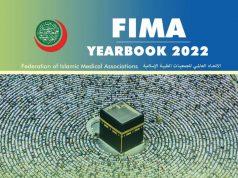“MEDICAL DILEMMAS IN DEVELOPING
COUNTRIES AND THE ROLE OF THE MEDICAL PROFESSION! COMMUNICABLE DISEASES“
In collaboration with
Islamic Medical Association-Kingdom of (IMAKSA)
The World Assembly of Muslim Youth (WAMY)
Editor in Chief
Prof Dr. Hossam E. Fadel
MD, FACOG,
Professor of Obstetrics & Gynecology
Augusta,
Editorial Board
Prof Dr. Muhammad A. A. Khan, MD
Emeritus
Dept. of Obstetrics & Gynecology at
University of Illinois ,
Chicago, Illinois,
Dr. Aly Mishal
MD, FACP
Chief of Medical Staff
Islamic Hospital Amman-Jordan
Hafeez ur Rahman
FCPS, ICO ( London )
Associate Professor
Islamic International Medical College
Rawalpindi-Pakistan
-
- The Islamic Approach To Combating AIDS: Experience From . Magid Kagimu
- International Muslim Efforts To Combat HIV/AIDS
- Where We Cautiously Agree and where we disagree with the western campaign against AIDS. Malik Badri
- the Global Burden of Falciparum Malaria and Strategies for control.
Mustafa Idris Elbashir
- Shistosomiasis: Scientific, Social and Religious Horizons.
- NabilMawsouf
- Role of Islamic Teaching in Prevention of Chronic Hepatitis B and C.
Najib ul Haq
- Tuberculosis in the New Millennium.
Khalid Abu-Romman & Faroque Khan
- Breast Feeding: ProphylaxisAgainst Communicable Diseases and A Key Child Survival Strategy.
Musa M. Nordin
- A Critique Of The Biomedical Model From An Islamic Perspective.
Omer K. Kasule
This issue of FIMA Year Book addresses the prevalent infection such as HIV, malaria, schistosomiasis, hepatitis, tuberculosis, along with very illuminating articles on breast feeding and a critique of the biomedical model.
While there is no dearth of literature regarding thee common infections, the distinguishing feature of the FIMA publication is that it brings in, and ties together the Islamic teaching from the Quran and Sunnah, and instructs us how these teachings, if applied diligently of these major infections.
The authors also make it very clear that there is great need and urgency in getting diverse groups from all sectors of society to join hands and address the multifaceted aspects of prevention through public education, and continue with the search for better treatments. There is a clear organization in this task ahead.
I personally enjoyed reading these very informative articles, and just as I found FIMA’s 2002 Year Book on Ethics very useful, I am confident this issue will also be a great source of information and reference for all.
Faroque Khan
Professor of Medicine, Master and former
Regent American College of Physicians
President and spokesperson-Islamic Center of Long Island, New York .
Member Majlis Shura- Islamic Society of North America
The 2003 Year Book examined major epidemic and pandemic dilemmas in an unprecedented manner.
For the first time, serious health issue were addressed from a contemporary evidence-based perspective, as well as the ethical and behavioral Islamic guidance as outlined in the Quraan, and the prophetic tradition. The main objective is to provide a comprehensive outlook towards prevention and management, which could be effectively inculcated in curriculum of Islamic medical schools and training programs. The role of Muslim medical professionals, and Islamic medical societies, in cooperation with religious leaders and official health authorities, have been properly highlighted, to make this issue unique reference.
ALY A. MISHAL, MD FACP
FIMA President
Chief of Medical Staff
Islamic Hospital- Amman, Jordon











